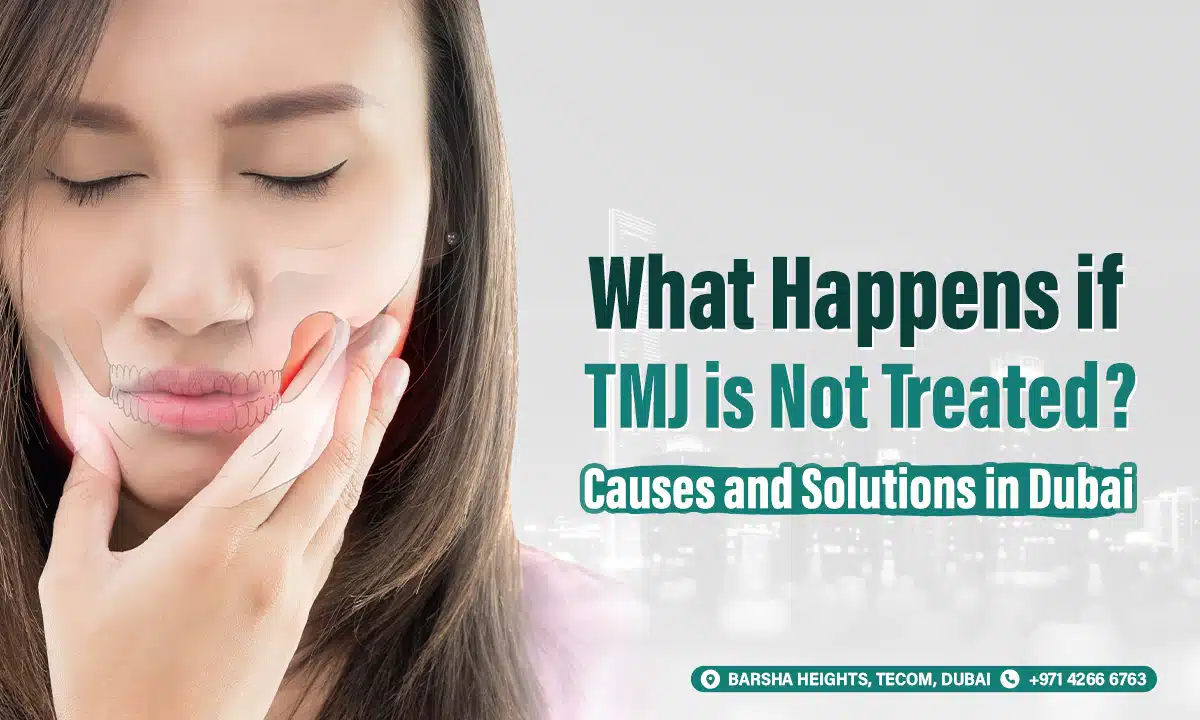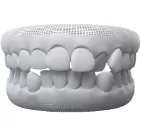The temporomandibular joint (TMJ) is one of the most complex and important joints in the body, connecting your jawbone to your skull. It plays a vital role in everyday activities such as speaking, chewing, and facial expressions. However, when TMJ disorders (TMD) occur, they can lead to pain, discomfort, and significant functional problems. Left untreated, TMD can cause chronic pain, worsen over time, and result in severe complications.
In Dubai, the advanced dental care provided at Mint Dental Care ensures patients receive timely diagnosis and treatment for TMJ disorders, preventing long-term damage and restoring comfort. This article will explore the causes, consequences of untreated TMJ, and the best solutions available in Dubai.
What Causes TMJ Disorders?
TMJ disorders arise when the joint, surrounding muscles, or ligaments become inflamed, irritated, or damaged. Several physical factors can contribute to this condition:
- Jaw Injury: Trauma to the jaw or head, such as an accident or sports injury, can dislocate or damage the joint.
- Arthritis: Conditions like osteoarthritis or rheumatoid arthritis can erode the cartilage within the TMJ, causing pain and stiffness.
- Bite Misalignment: An uneven bite places extra stress on the joint, leading to inflammation and discomfort.
- Bruxism: Teeth grinding or clenching, often caused by stress, exerts excessive pressure on the joint.
How Do Lifestyle and Psychological Factors Impact TMJ?
In addition to physical factors, lifestyle habits and emotional stress also contribute to TMJ disorders:
- Stress and Anxiety: Emotional tension can cause involuntary jaw clenching, leading to muscle fatigue and joint strain.
- Poor Posture: Slouching or holding your head in an unnatural position strains the jaw joint.
- Dietary Habits: Consuming hard or chewy foods can exacerbate TMJ symptoms.
At Mint Dental Care, our experienced dentists and specialists evaluate these factors to determine the root cause of TMJ disorders and develop a tailored treatment plan.
How Does Untreated TMJ Impact Your Health Over Time?
If TMJ disorders are ignored and left untreated, the condition can worsen and lead to significant health complications:
- Chronic Pain: Jaw pain, headaches, and facial discomfort may become persistent and debilitating, affecting your ability to eat, speak, or smile comfortably.
- Joint Damage: Untreated TMD can result in irreversible damage to the joint, cartilage, and surrounding muscles, making treatment more complex in the future.
- Jaw Locking: The jaw may lock open or closed, restricting movement and requiring urgent medical intervention.
Can TMJ Affect Other Parts of the Body?
Yes, TMJ disorders can cause pain and discomfort beyond the jaw:
- Headaches and Migraines: The strain on the jaw muscles can trigger frequent headaches or migraines.
- Ear Pain and Tinnitus: TMJ inflammation may radiate to the ear, leading to ringing sounds (tinnitus) or pressure.
- Neck and Shoulder Pain: TMD can cause muscle tension in the neck and shoulders, resulting in discomfort and reduced mobility.
Early intervention at Mint Dental Care can help prevent these complications, ensuring a pain-free and functional jaw.
What Are the Common Symptoms of TMJ Disorders?
TMJ disorders often manifest through a variety of symptoms, including:
- Jaw Pain or Tenderness: Persistent discomfort around the jaw joint and cheeks.
- Clicking or Popping Sounds: Audible sounds when opening or closing the mouth.
- Difficulty Chewing: Pain or limited jaw movement when eating.
- Lockjaw: Sudden inability to fully open or close the mouth.
Are There Other Signs of TMJ Disorders?
In addition to the primary symptoms, you may also experience:
- Headaches or Migraines
- Earaches or Ringing in the Ears
- Swelling on the Side of the Face
- Facial Fatigue
If you notice any of these symptoms, seeking timely care at Mint Dental Care in Dubai is essential to prevent further complications.
How Are TMJ Disorders Diagnosed at Mint Dental Care?
At Mint Dental Care, our team of dental experts uses advanced technology and techniques to accurately diagnose TMJ disorders. The diagnostic process includes:
- Comprehensive Examination: Our dentists assess your jaw movement, bite alignment, and areas of tenderness.
- Imaging Tests: X-rays, CT scans, or MRI scans may be used to examine the joint and surrounding structures for signs of damage or inflammation.
- Medical History Review: We discuss your symptoms, lifestyle habits, and any history of injuries or stress.
Why Is Early Diagnosis Important?
Identifying TMJ disorders early ensures effective and minimally invasive treatment. Delayed diagnosis may lead to severe joint damage, making treatment more complex and costly.
How Does Mint Dental Care Treat TMJ Disorders?
At Mint Dental Care, we offer a variety of treatments tailored to the severity and cause of your TMJ disorder:
- Custom Mouthguards and Splints:
- Nightguards help reduce pressure from teeth grinding or clenching, protecting the joint and relieving pain.
- Splints provide gentle support and alignment for the jaw.
- Medications:
- Pain relievers and anti-inflammatories help manage discomfort and inflammation.
- Muscle relaxants may be prescribed for severe muscle tension.
- Stress Management Techniques:
- Counseling, relaxation exercises, and breathing techniques help patients manage stress-related clenching and grinding.
Are There Advanced TMJ Treatments Available?
For patients with severe or chronic TMJ disorders, Mint Dental Care offers advanced solutions, including:
- Dental Correction: Bite misalignment can be addressed with orthodontic treatments like Invisalign or restorative dental work.
- Physical Therapy: Specialized jaw exercises strengthen muscles and improve joint mobility.
- Minimally Invasive Procedures: In cases of joint damage, procedures like arthrocentesis (flushing the joint) or injections may be recommended.
Our team focuses on providing conservative, non-invasive treatments first, ensuring long-term relief without unnecessary procedures.
How Can You Protect Your Jaw Health?
While not all TMJ disorders can be prevented, certain habits can reduce your risk:
- Avoid Clenching and Grinding: Stress management and wearing a nightguard can help prevent bruxism.
- Maintain Good Posture: Sit upright and avoid straining your jaw by resting your chin on your hand.
- Eat Soft Foods: Reduce strain on the jaw by avoiding hard, chewy, or sticky foods.
Why Are Regular Dental Visits Important?
Routine dental checkups at Mint Dental Care allow early detection of TMJ issues and other dental concerns. Our experienced dentists can identify risk factors and provide preventive solutions tailored to your needs.
Why Choose Mint Dental Care in Dubai for TMJ Treatment?
At Mint Dental Care, we prioritize patient comfort and well-being. Here’s why we are Dubai’s trusted dental clinic for TMJ treatment:
- Expert Team: Led by highly experienced dental specialists like Dr. Reji Moideen and Dr. Vishita Navin, our team is dedicated to diagnosing and treating TMJ disorders effectively.
- Advanced Technology: We use state-of-the-art imaging tools and diagnostic methods to ensure accurate assessments.
- Personalized Care: Every treatment plan is tailored to meet individual needs, ensuring long-lasting relief and improved jaw function.
What Do Our Patients Say?
Our patients often express relief and satisfaction after receiving TMJ treatment at Mint Dental Care:
- “The pain I had been experiencing for years disappeared after Dr. Reji’s treatment plan. My jaw feels better than ever!”
- “Mint Dental Care’s team is compassionate and professional. They explained every step, and the results are incredible.”
Conclusion
Ignoring TMJ disorders can lead to chronic pain, limited jaw function, and a significant impact on your quality of life. At Mint Dental Care, we offer advanced, patient-centered solutions to diagnose and treat TMJ disorders effectively. Whether you’re experiencing mild discomfort or severe symptoms, our experienced team is here to help you regain a pain-free and functional jaw.
Don’t wait—book your consultation at Mint Dental Care in Dubai today and take the first step towards lasting relief and improved oral health.















